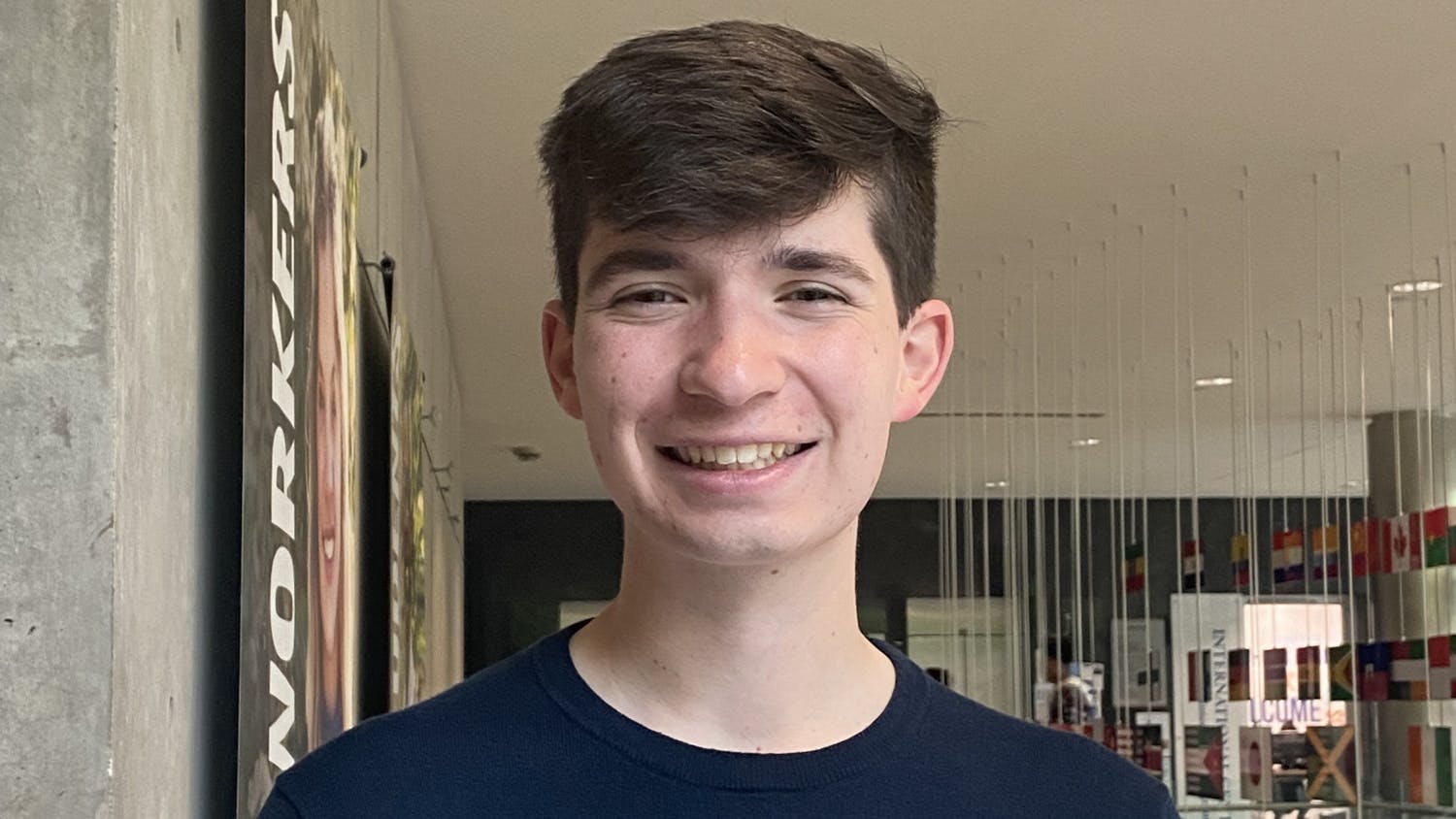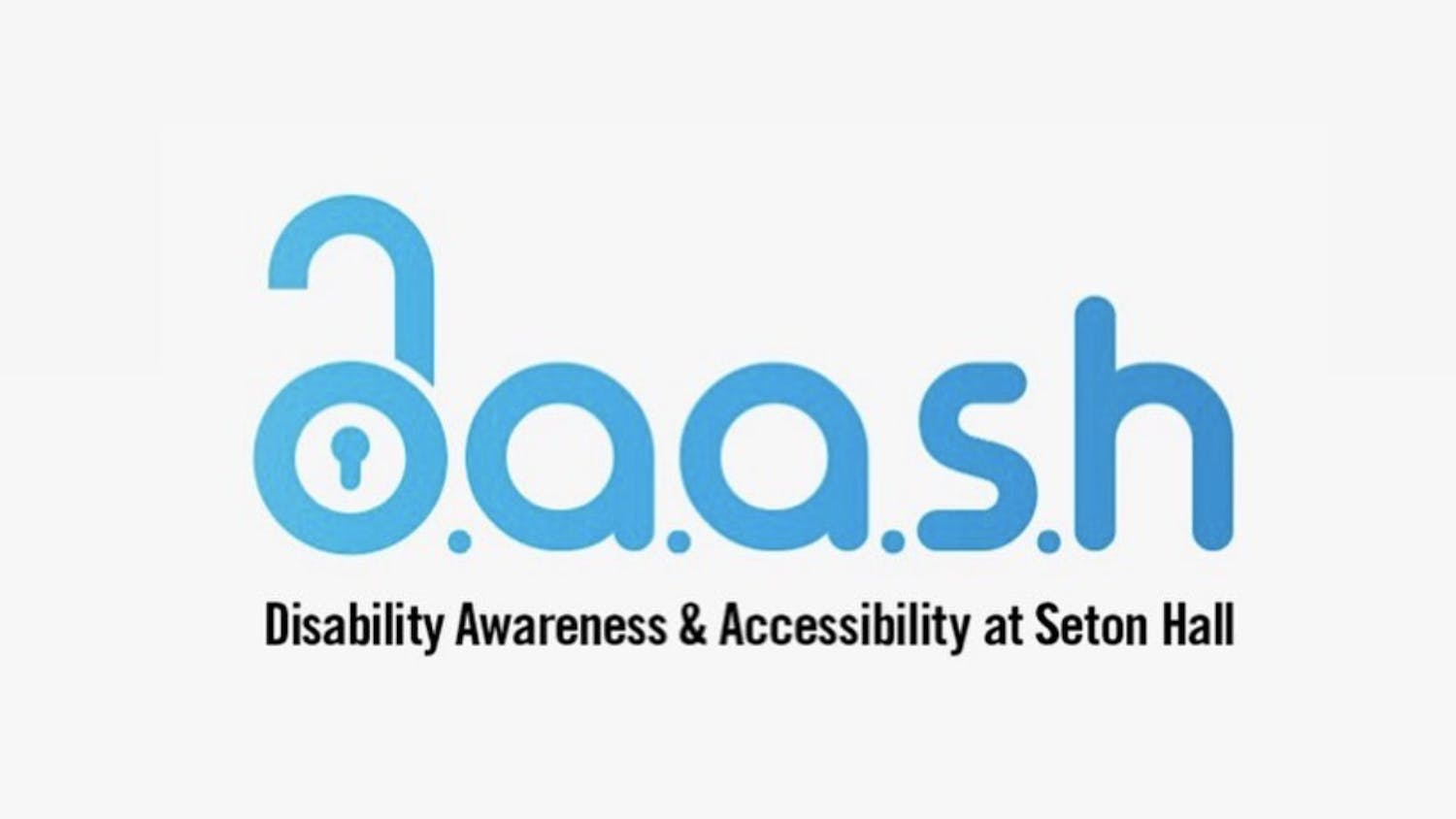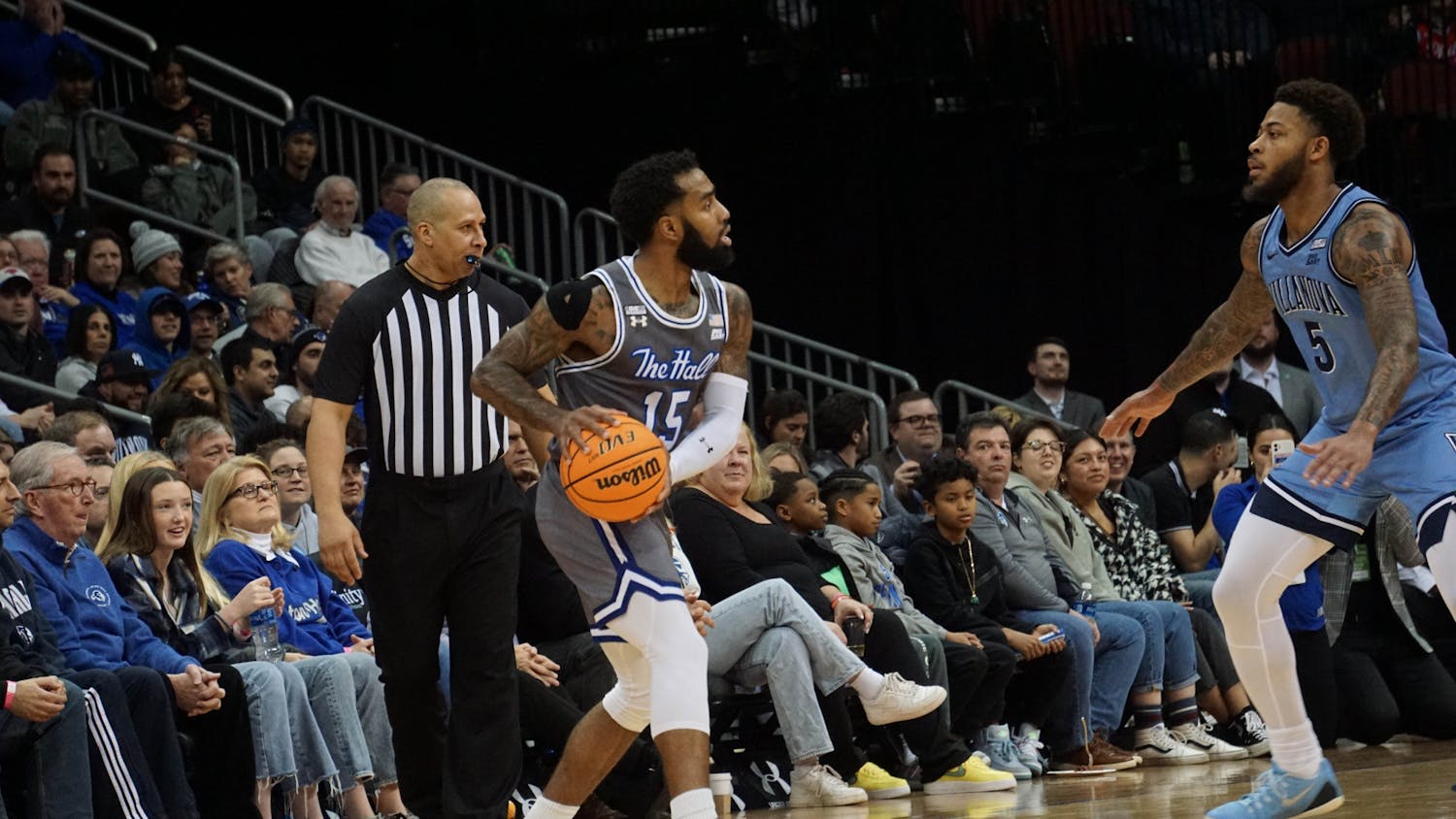[caption id="attachment_15099" align="aligncenter" width="838"] The rainbow Pride flag is the symbol for the LGBTQ community. Photo courtesy of Madeline Wilson[/caption]
In just the last week, increased dialogue surrounding the LGBTQ (lesbian, gay, bisexual, transgender and queer) community at Seton Hall has led 10 additional students to join the ALLIES club, a safe space for the LGBTQ community and its supporters on campus.
ALLIES, now consists of 20 members, including the 10 who just joined. The group is advised by the Associate Dean of Students, Winston Roberts, from the department of Student Life.
“The hope that I have for the ALLIES at SHU group is for them to do just as their mission states, which is to support, protect, respect and defend all members of the Seton Hall University community,” Roberts said in an email interview. “ALLIES at SHU has the opportunity to support our various student organizations and general student body to create a space for productive dialogue on our campus.”
Roberts said that he helps ALLIES navigate their experience as a club on campus, and models the behavior of respect, understanding, and caring. Additionally, Roberts provides advice and support for its members.
According to ALLIES president Madeleine Scheifele, a junior art design and interactive media major, Associate Vice President and Dean of Students Karen Van Norman contacted the club in regards to funding following the Sept. 8 issue of The Setonian.
“Apparently we have always had funding but we just didn’t know how to access it, or that we could use it,” Scheifele said. ALLIES receives direct funding from the Vice President for the Division of Student Services.
Funding can be used to assist with programming for the ALLIES club, once approved by Roberts. The club and its executive board members must comply with regulations set by the Archdiocese of Newark.
“In order to be a club, the original founding members signed an agreement with the Archdiocese saying that they will keep with the Catholic teachings where we wouldn’t go against the Archdiocese,” Scheifele said.
While ALLIES can’t promote the “gay agenda” and has to keep in accordance with Catholic teachings, Scheifele said members can seek student interest at involvement fairs and through advertising events.
Treasurer Charlotte Slocum, a sophomore broadcasting and creative writing major, learned about ALLIES as a result of dialogue for the LGBTQ community at Seton Hall.
“I didn’t even know that this group existed on campus,” Slocum said. “Then at one point last year, I saw them with their advertisements (at a student involvement fair) and I was like, ‘I definitely want to join this.’”
Scheifele, the ALLIES president, said she wants to use her role to help support those in the LGBTQ community who struggle with being accepted.
“I grew up in a part of Baltimore where it’s really acceptable if you want to experiment or you come out, and you’re like, ‘I identify with this community,’” Scheifele said. “I know that not a lot of people had that, so I wanted to provide whatever support I could for the community, and that’s why I wanted to join (ALLIES). That was my prime reason.”
Secretary Andrew Proctor, a sophomore broadcasting and visual arts major with a concentration in film, said ALLIES was once known as Spectrum on campus.
According to a Sept. 26, 2002 article published in The Setonian, Spectrum submitted an application to be recognized as a campus organization in the spring of the year.
The Setonian’s 2002 article stated, “According to Spectrum’s mission statement, ‘Spectrum is a student group that provides a forum for Seton Hall University students to address issues of sexual orientation. Based on the principles of Courage, an apostolate of the Roman Catholic Church which ministers to those with same-sex attractions and their loved ones, Spectrum will work to eradicate problems of misunderstanding and to foster respect, compassion and sensitivity through education and communication.”
Scheifele said her goal is to build up ALLIES to where everyone on campus knows that it’s a safe space, and if students are part of the community or support the community, they are fully welcome.
Proctor said he got more involved with the club to feel further connected to the community.
“I joined the club because I didn’t have, pretty much, any LGBT friends; being part of the community I felt very isolated,” Proctor said. “I wanted to help the club and explain the organization so that if there were other people out there who also feel isolated, I could bring the club to them and help them in some way.”
The ALLIES executive board wants continued dialogue about the LGBTQ community at SHU to raise awareness of the club for other students seeking an organization of its kind.
“Part of our mission is to really increase the understanding of the LGBTQ community and the struggles that we face,” Proctor said. “If people understood what we’re going through and who we are, and that it’s not a choice to be who we are, then I think there’d be so much more acceptance.”
Vice President Samantha Mendez, a sophomore social work major, said she was “fairly surprised” to see acceptance of the LGBTQ community from more students and faculty than she originally perceived.
“The LGBTQ+ community on campus still seemed to lack diversity, as many students were afraid to openly be involved with our club or anything relating to LGBTQ+ issues due to the Archbishop’s messages earlier in the year,” Mendez said in an email interview. “This year looks incredibly promising due to the club gaining better awareness and recognition than it had previously.”
Leah Carton can be reached at leah.carton@student.shu.edu.
The rainbow Pride flag is the symbol for the LGBTQ community. Photo courtesy of Madeline Wilson[/caption]
In just the last week, increased dialogue surrounding the LGBTQ (lesbian, gay, bisexual, transgender and queer) community at Seton Hall has led 10 additional students to join the ALLIES club, a safe space for the LGBTQ community and its supporters on campus.
ALLIES, now consists of 20 members, including the 10 who just joined. The group is advised by the Associate Dean of Students, Winston Roberts, from the department of Student Life.
“The hope that I have for the ALLIES at SHU group is for them to do just as their mission states, which is to support, protect, respect and defend all members of the Seton Hall University community,” Roberts said in an email interview. “ALLIES at SHU has the opportunity to support our various student organizations and general student body to create a space for productive dialogue on our campus.”
Roberts said that he helps ALLIES navigate their experience as a club on campus, and models the behavior of respect, understanding, and caring. Additionally, Roberts provides advice and support for its members.
According to ALLIES president Madeleine Scheifele, a junior art design and interactive media major, Associate Vice President and Dean of Students Karen Van Norman contacted the club in regards to funding following the Sept. 8 issue of The Setonian.
“Apparently we have always had funding but we just didn’t know how to access it, or that we could use it,” Scheifele said. ALLIES receives direct funding from the Vice President for the Division of Student Services.
Funding can be used to assist with programming for the ALLIES club, once approved by Roberts. The club and its executive board members must comply with regulations set by the Archdiocese of Newark.
“In order to be a club, the original founding members signed an agreement with the Archdiocese saying that they will keep with the Catholic teachings where we wouldn’t go against the Archdiocese,” Scheifele said.
While ALLIES can’t promote the “gay agenda” and has to keep in accordance with Catholic teachings, Scheifele said members can seek student interest at involvement fairs and through advertising events.
Treasurer Charlotte Slocum, a sophomore broadcasting and creative writing major, learned about ALLIES as a result of dialogue for the LGBTQ community at Seton Hall.
“I didn’t even know that this group existed on campus,” Slocum said. “Then at one point last year, I saw them with their advertisements (at a student involvement fair) and I was like, ‘I definitely want to join this.’”
Scheifele, the ALLIES president, said she wants to use her role to help support those in the LGBTQ community who struggle with being accepted.
“I grew up in a part of Baltimore where it’s really acceptable if you want to experiment or you come out, and you’re like, ‘I identify with this community,’” Scheifele said. “I know that not a lot of people had that, so I wanted to provide whatever support I could for the community, and that’s why I wanted to join (ALLIES). That was my prime reason.”
Secretary Andrew Proctor, a sophomore broadcasting and visual arts major with a concentration in film, said ALLIES was once known as Spectrum on campus.
According to a Sept. 26, 2002 article published in The Setonian, Spectrum submitted an application to be recognized as a campus organization in the spring of the year.
The Setonian’s 2002 article stated, “According to Spectrum’s mission statement, ‘Spectrum is a student group that provides a forum for Seton Hall University students to address issues of sexual orientation. Based on the principles of Courage, an apostolate of the Roman Catholic Church which ministers to those with same-sex attractions and their loved ones, Spectrum will work to eradicate problems of misunderstanding and to foster respect, compassion and sensitivity through education and communication.”
Scheifele said her goal is to build up ALLIES to where everyone on campus knows that it’s a safe space, and if students are part of the community or support the community, they are fully welcome.
Proctor said he got more involved with the club to feel further connected to the community.
“I joined the club because I didn’t have, pretty much, any LGBT friends; being part of the community I felt very isolated,” Proctor said. “I wanted to help the club and explain the organization so that if there were other people out there who also feel isolated, I could bring the club to them and help them in some way.”
The ALLIES executive board wants continued dialogue about the LGBTQ community at SHU to raise awareness of the club for other students seeking an organization of its kind.
“Part of our mission is to really increase the understanding of the LGBTQ community and the struggles that we face,” Proctor said. “If people understood what we’re going through and who we are, and that it’s not a choice to be who we are, then I think there’d be so much more acceptance.”
Vice President Samantha Mendez, a sophomore social work major, said she was “fairly surprised” to see acceptance of the LGBTQ community from more students and faculty than she originally perceived.
“The LGBTQ+ community on campus still seemed to lack diversity, as many students were afraid to openly be involved with our club or anything relating to LGBTQ+ issues due to the Archbishop’s messages earlier in the year,” Mendez said in an email interview. “This year looks incredibly promising due to the club gaining better awareness and recognition than it had previously.”
Leah Carton can be reached at leah.carton@student.shu.edu.





